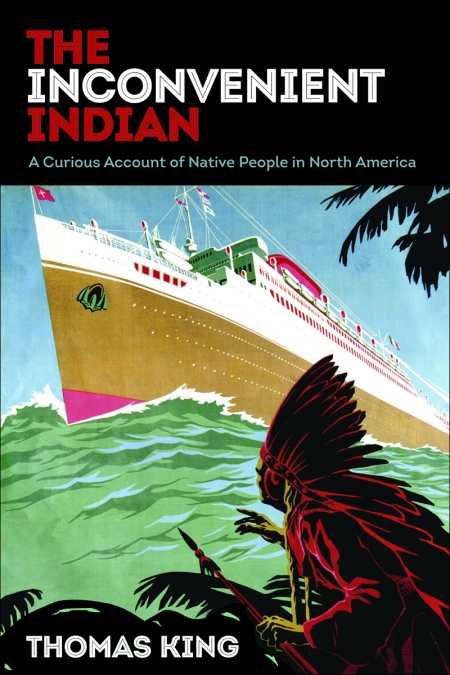The Inconvenient Indian
A Curious Account of Native People in North America
Glib humor gives way to serious discussion of historic and modern treatment of Indians.
“Most of the history of Indians in North America has been forgotten,” says Canadian (and Cherokee) author Thomas King. “What we are left with is a series of entertainments.”
One such entertainment is King’s new book, The Inconvenient Indian: A Curious Account of Native People in North America. Quite intentionally described by the author as an “account” and not a “history,” the work is an at times glib, often funny, yet always serious observation of what it meant and means to be a Cherokee, Sioux, Mohawk, or one of the hundreds of tribal peoples that have been recklessly, sadly, and injuriously lumped together into the meaningless if convenient grouping called “Indian.”
Like any good entertainer, King warms up his audience by opening with not just a joke but two chapters of jokes on how European settlers and their descendants, especially those in Hollywood, have viewed those who were here before them through a kind of romantic noble savage haze. “Hollywood has had a longstanding love affair with Indians,” explains King. “Indians were made for film. Indians were exotic and erotic. All those feathers, all that face paint,” and, of course, “the skimpy loincloth” which so many movie Indians continue to sport quite provocatively.
In chapter three, King starts to shift the mood, although his notation that all Indians fall into one of three categories—“Dead Indians, Live Indians, and Legal Indians”—seems to indicate that he will continue the amusing diatribes and comic observations. King, however, gently segues from comedic quips to thought-provoking anecdotes, many of them drawn from his personal experiences growing up as an Indian in Canada and California, including his mercifully truncated stay in a Christian Brothers boarding school in the late 1950s.
By the conclusion of chapter four, the last of the lighthearted appetizers have been cleared away, and King presents his audience with the story of how Indians have not only been mistreated in the past but also of how modern-day society seeks to eradicate the Indian through conversion, education, and assimilation.
From chapter five on, his tone alternates between that of saddened reporter and indignant activist. He laments the negative side of the many supposedly benign laws and charitable acts by good-intentioned governments and seemingly well-meaning people, notably the founder of the Carlisle Schools for Indians and those who have brought “the new buffalo,” as he calls it, of casino gambling to tribal lands.
While King lures in and even captivates (as well as entertains) his readers in the opening chapters, he is likely to lose many when his “curious account” turns into a diatribe. Those with a personal stake in the cause of the Indian nations may continue with what is perhaps meant to be a wake-up call and rallying cry to regain sovereignty over their lives and lands; others may start to disengage from the narrative or simply set the book down. That is unfortunate, as King does have a story to tell and a point to make—both of which have, like his ancestors, too often been ignored, forgotten, or dismissed by white society.
Reviewed by
Mark McLaughlin
Disclosure: This article is not an endorsement, but a review. The publisher of this book provided free copies of the book to have their book reviewed by a professional reviewer. No fee was paid by the publisher for this review. Foreword Reviews only recommends books that we love. Foreword Magazine, Inc. is disclosing this in accordance with the Federal Trade Commission’s 16 CFR, Part 255.

